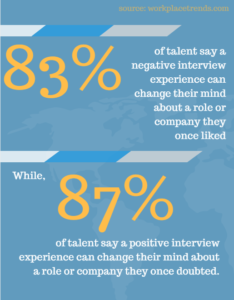
“I just wish they would have spent more time explaining how I could grow with the company. The career vision with them is unclear.”
“The more I think about it, he didn’t seem very interested in learning about me. It was very dry and the questioning was robotic.”
“This would’ve been easier a few weeks ago. I now have interviews at two other shops and I’d rather feel those out before I make a decision here.”
“The money sounds good, but I still don’t know that it’s a good fit. I just didn’t feel the chemistry. I was hoping to really connect with my potential supervisor, and that didn’t happen.”
These are concerns I’ve heard a number of times in the last year from our candidates, in reference to both our clients and their competitors. Candidates get down to the final stage, and they start to have second thoughts. They begin replaying the entire process, every interaction, in their minds and aloud to me, their recruiter.

But why are candidates being non-committal and picky all of a sudden?
Because they can be.
It’s not a whole lot different than dating. If you’ve only got one date lined up, you’ll likely linger longer over drinks, and you’ll ask deeper questions, searching hard for common ground and reveling in the little connections that forge. Your date doesn’t have to be perfect for it to be a good fit, especially when they are the only one competing for your attention. However, if you have a few dates lined up next week, you’re likely to critique them harder and spend less time giving them second and third chances to be right for you. Right now, in a candidate-driven market, candidates have several suitors within their gaze, and it’s not going to be as easy for your company to become their long-term choice without putting your best foot forward.
Here are 10 tips I’ve developed to help you compete in a candidate-driven market, and ensure that candidates leave an interview with your company feeling excited, valued, and energized.
1. Set the stage
Provide the candidate with an overview of the interview process early on so candidates are aware of the time commitment. Prior to each call or meeting, be sure the candidate knows to whom they will be speaking, their title and relationship to this position (hiring manager, peer, direct report, leader), and approximately how long the call or meeting is expected to last. Be sure the interview process includes at least one team member or peer, as opposed to only supervisors and leaders.
2. Do your research and listen carefully
Review the candidate’s resume and any accompanying notes prior to each interaction with the candidate. Remembering a small detail can set you apart from a hiring manager at another company. Also, take notes during your calls/meetings to refer back to in future conversations. Share these notes with anyone else who may be interviewing the candidate so you can be sure to diversify your conversations. While it’s helpful to have a few interviewers ask the same question to determine consistency in a candidate’s responses, it’s also important to ask a variety of questions to avoid a Groundhog Day interview experience.
3. Collaborate
Identify the key questions/concerns that need to be addressed during an interview and divide them up among the interviewers. This is especially important for new managers or junior/peer-level employees who may not have much experience interviewing potential employees or selling the company. Make sure everyone is consistent (and positive) in how they describe the company, team, and position. It is not uncommon for candidates to leave an interview with mixed messages.

4. Sell it
Prepare a clear “elevator pitch” for your company and department, and be sure to communicate this with candidates throughout the process. What makes it a better choice than your competitors? What do you do differently/better? What is your culture like? What is the company’s philosophy and vision? Also be prepared to discuss any challenges your company/division may be facing. It is better to hear it from you as opposed to the rumor mill.
5. Know what you want and what you can offer in return
Be able to answer these questions about the position for which you’re hiring:
- What does the day-to-day look like? Be able to discuss specific activities and give a realistic breakdown for how much time will be spent doing each of these things.
- What is the reporting structure? How many people with be reporting into this position and what are their titles?
- What is the natural progression from this role to the next in terms of title and time frame?
- What does the team look like right now? (How many people, what are their titles, strengths and weaknesses on the team, personality of the team, tenures, etc.)
- Who are your clients and what type of work are you doing for them?
- What are the expectations/goals for this position in the first 90 days, 6 months, and 12 months?

6. Talk about yourself, too
Be able to discuss your personal leadership and management styles, and your general expectations of your employees. If you’re unsure, ask people who report to you for some insight. There are also assessments out there to help you discover your style and put it into words. Oftentimes, candidates choose (and leave) jobs because of their boss. Be an open book and offer honest descriptions of what it is like to work for you.
7. Warm them up
If possible, have each person who will be interviewing face-to-face with a candidate email them the day before to introduce themselves and share their excitement in meeting the candidate.
For example,
“Hi John. We are anticipating your arrival at our New York City office tomorrow at 1 PM, and we expect you to spend roughly 3 hours with our leadership team. I’ve included our address below. You and I will be meeting at 2:30 PM according to my schedule, and I am looking forward to our conversation. If you need anything in the meantime, please don’t hesitate to reach out to me or Human Resources.
Best, Susan”
8. Be a good host
Greet candidates warmly and by name when they arrive at your office. Offer them something to drink and a comfortable place to wait for their meeting to begin, preferably out of earshot of any hectic business activities or conversations. During transitions and at the end of the interview, escort the candidate, provide hand-offs with clear introductions, and offer to answer any interim questions. Don’t forget to offer a restroom break for interviews that run a bit long.
9. Don’t leave them hanging
Provide timely feedback throughout the process, regardless of your interest level. Some information is always better than none. Candidates will share their interview experiences with colleagues and recruiters, and reputation management is a much easier task if you’re proactive, and not in repair mode. Even if Candidate A is not ideal, their colleague Candidate B might be and they may choose not to engage with you if they hear it is a slow-moving and inefficient process, or if the impression is that you’re pipelining candidates and shopping the marketplace for future, not immediate, needs.
10. Have fun
Let your personality and the personality of your team and brand shine throughout the process. You don’t need an aggressive Q&A firing squad to appropriately screen candidates. Develop solid, meaningful questions that are unique to your company and work to make conversations flow as organically as possible.
Laugh. Smile. Be your genuine self.
Final thoughts
Let’s be honest. None of what I’ve shared with you is groundbreaking. However, incorporating these simple tactics into your interview process can turn the mundane into something memorable. And that is what is necessary right now to be competitive. It can increase your chances of getting critical talent in place as soon as possible, which has been shown to save companies significantly in terms of actual dollars, productivity, employee retention, and lost opportunity. Give these a shot and let me know what you think. The market has changed and we are all adjusting at different speeds, so let’s step on the gas!
